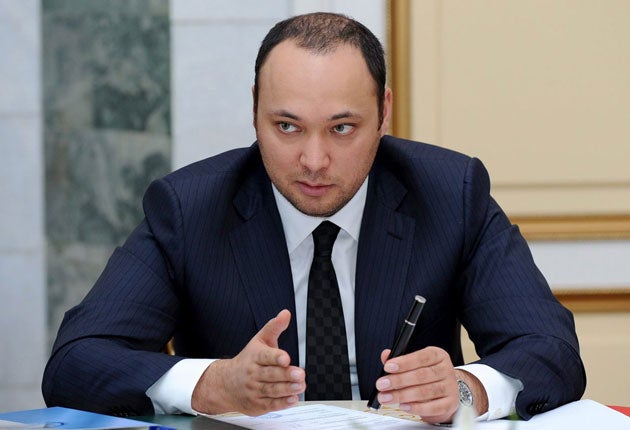Kyrgyzstan's 'prince' Maxim Bakiyev in the dock as US extradition battle begins
Prosecutors in the United States allege that the Kyrgyz businessman was involved in a complex insider trading scheme that netted millions of pounds on the New York stock exchange

When his father was in power he was known as “The Prince” and was widely believed to be the richest man in the former Soviet state of Kyrgyzstan. He rarely left his luxury mansion without a retinue of bodyguards and was often spotted hurtling through the streets of Bishkek with a convoy of armoured SUVs following close behind.
Maxim Bakiyev struck a lonely figure as he sat in the dock at Westminster Magistrates’ court. Dressed in a pink shirt and dark suit, the 34-year-old son of fallen strongman Kurmanbek Bakiyev appeared for the first hearing of what is likely to become a lengthy and costly extradition battle.
Prosecutors in the United States allege that the Kyrgyz businessman was involved in a complex insider trading scheme that netted millions of pounds on the New York stock exchange in September last year. An affidavit from an FBI special agent which has been seen by The Independent states that one of Mr Bakiyev’s former business colleagues has “agreed to cooperate with the US government” and provide details on the alleged scheme.
Mr Bakiyev strenuously denies the claims and has vowed to fight any attempt to extradite him to the States. But the American extradition request is just one of the accusations that have dogged the controversial businessman ever since he fled from his homeland in a private jet, landed at Farnborough airport and tried to claim asylum.
In the spring of 2010, popular resentment against the increasingly despotic regime of Kurmanbek Bakiyev spilled over into street protests that led to the deaths of hundreds of demonstrators and eventually succeeded in forcing the loathed leader out of office.
Bakiyev senior had himself come to power five years earlier in a popular revolt known as the Tulip Revolution. Ordinary Kyrgyz, who live in one of Central Asia’s most impoverished countries where average annual household incomes still languishes around the $2,400 mark, had hoped that the revolution would herald a new era of prosperity and freedom. Instead, the new regime became increasingly authoritarian, corrupt and nepotistic.
Anger was directed at Kumanbek’s sons and immediate family members, who seemed to become wealthy off the back of government promotions. Maxim Bakiyev was out of the country when security forces fired on demonstrators, but the crowds quickly targeted many of his assets there, burning down his mansions and even a popular restaurant he owned in downtown Bishkek. (His father and uncle – who headed up the security forces – have both fled to Belarus where they have been given shelter by another dictator, Alexander Lukashenko.)
Ever since his flight, the new Kyrgyz government has been trying to extradite Bakiyev junior on their own charges, alleging that he embezzled tens of millions of dollars through a development agency he ran and on unpaid fuel duties at America’s strategically vital Manas airbase. He denies the charges.
Britain has no extradition treaty with the Central Asian republic and has been unwilling to return the fallen playboy out of fear that he would not receive a fair trial – a position that has caused immense ill will towards London in Bishkek.
But the recent extradition request from the US appears to have dug Britain out of a diplomatic hole. In court yesterday Bakiyev’s counsel, Hugo Keith QC – an extradition expert who also represents South Africa in the case against Shrien Dewani and led computer hacker Gary McKinnon’s legal team – attacked the motivations of the US.
The extradition request, he claimed, was “political…and made in bad faith”, Mr Bakiyev’s legal team, he added, were concerned that his arrest was part of a wider deal for the United States to hand the client over to the Kyrgyz authorities in return for them continuing to use Manas, an airbase on the outskirts of the capital that is a vital supply route for American forces in nearby Afghanistan.
Counsel for the United States did not respond to the claims yesterday but the Department of Justice has previously insisted that the investigation is a purely criminal one and has no involvement from the State Department.
The full extradition hearing was adjourned until 13 May and is scheduled to last four days.
Subscribe to Independent Premium to bookmark this article
Want to bookmark your favourite articles and stories to read or reference later? Start your Independent Premium subscription today.

Join our commenting forum
Join thought-provoking conversations, follow other Independent readers and see their replies